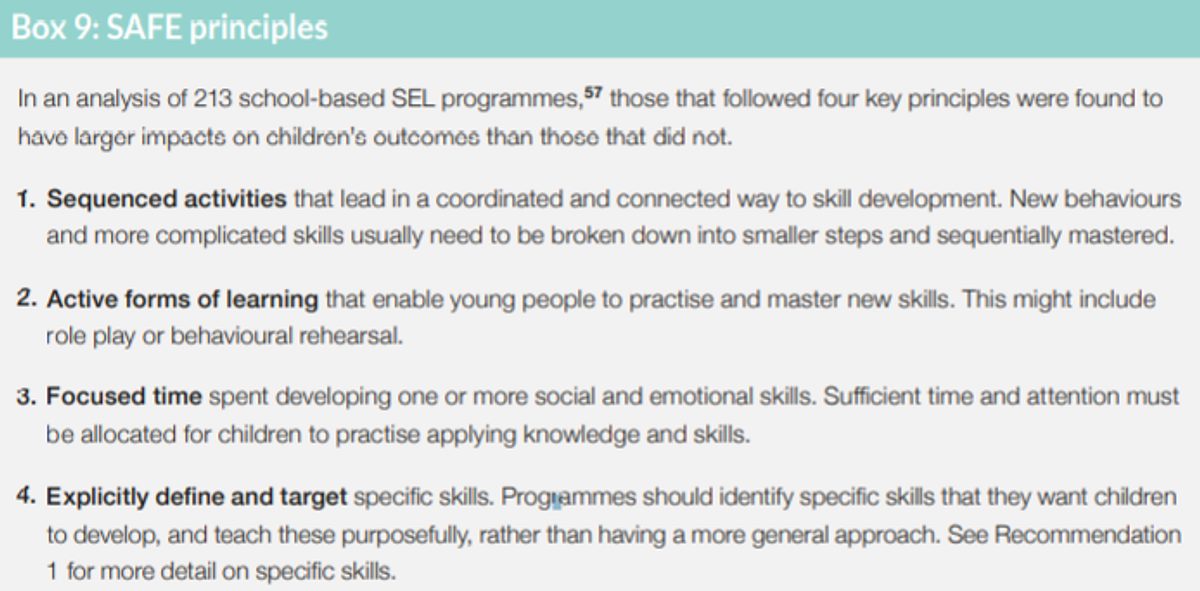
Blog -
Scaffolding to Support Working Memory Demands: Questions for Reflection
We share questions and resources to unpick the EEF’s Voices from the Classroom

Share on:

by Bradford Research School
on the
Teaching Social and Emotional Learning through planned programmes can improve attitudes to learning, relationships in school, and a range of other outcomes including academic achievement. Recommendation 4 of the EEF’s Improving Social and Emotional Learning in Primary Schools guidance report suggests that, to do this, we should ‘Use a SAFE curriculum: Sequential, Active, Focused and Explicit’.

The evidence
We love acronyms in education, don’t we? This particular one comes from Durlak et al (2011).
This was an meta-analysis of 213 school-based, universal social and emotional learning programmes. They looked at outcomes over a range of measures: social and emotional skills, attitudes towards self and others, positive social behaviour, conduct problems, emotional distress, and academic performance. One aspect the researchers were keen to explore was the ability for schools to effectively implement a SEL programme:
Thus, we investigated whether SEL programs can be incorporated into routine educational practice; that is, can they be successfully delivered by existing school staff during the regular school day?
Hypothesising that SEL programs which contained the recommended practice from the SAFE acronym were effective, one way that they examined the data was by using four questions to code studies.
(a) Does the program use a connected and coordinated set of activities to achieve their objectives relative to skill development? (Sequenced);
(b) Does the program use active forms of learning to help youth learn new skills? (Active);
© Does the program have at least one component devoted to developing personal or social skills? (Focused); and,
(d) Does the program target specific SEL skills rather than targeting skills or positive development in general terms? (Explicit).
They ultimately conclude,
“As predicted, two variables moderated positive student outcomes: SAFE practices and implementation problems, suggesting that beneficial programs must be both well-designed and well-conducted.”
How to keep things SAFE
The guidance report covers each of these things in detail, and we would also recommend reading the accompanying evidence review if you are going to implement a SEL programme. The questions the researchers used above may also be useful.
Sequence lessons to build skills progressively:
Use active forms of learning
Focus your time
Be explicit about the skills you want children to develop
One final point we would note about this particular metaanalysis – they also looked at whether implementation was successful e.g. where teachers reported no problems with implementing the intervention as intended. And when theree were implementation problems, the programmes were less effective. So, SEL programmes must be SAFE, but implementation must be sound.
Subscribe to our newsletter for the latest updates in evidence-informed practice.
Durlak, J. A., Weissberg, R. P., Dymnicki, A. B., Taylor, R. D. & Schellinger, K. B. (2011). The impact of enhancing students’ social and emotional learning: A meta-analysis of school-based universal interventions. Child Development, 82(1): 405 – 432.
Wigelsworth, M., Verity, L., Mason, C., Humphrey,N., Qualter, P., Troncoso, P. (2019). Primary Social and Emotional Learning: Evidence review. London: Education Endowment Foundation.

Blog -
We share questions and resources to unpick the EEF’s Voices from the Classroom

Blog -
Investing in Subject Knowledge has Multiple Benefits

Blog -
Success is an important factor in motivation – how do we reconcile that with desirable difficulty?
This website collects a number of cookies from its users for improving your overall experience of the site.Read more